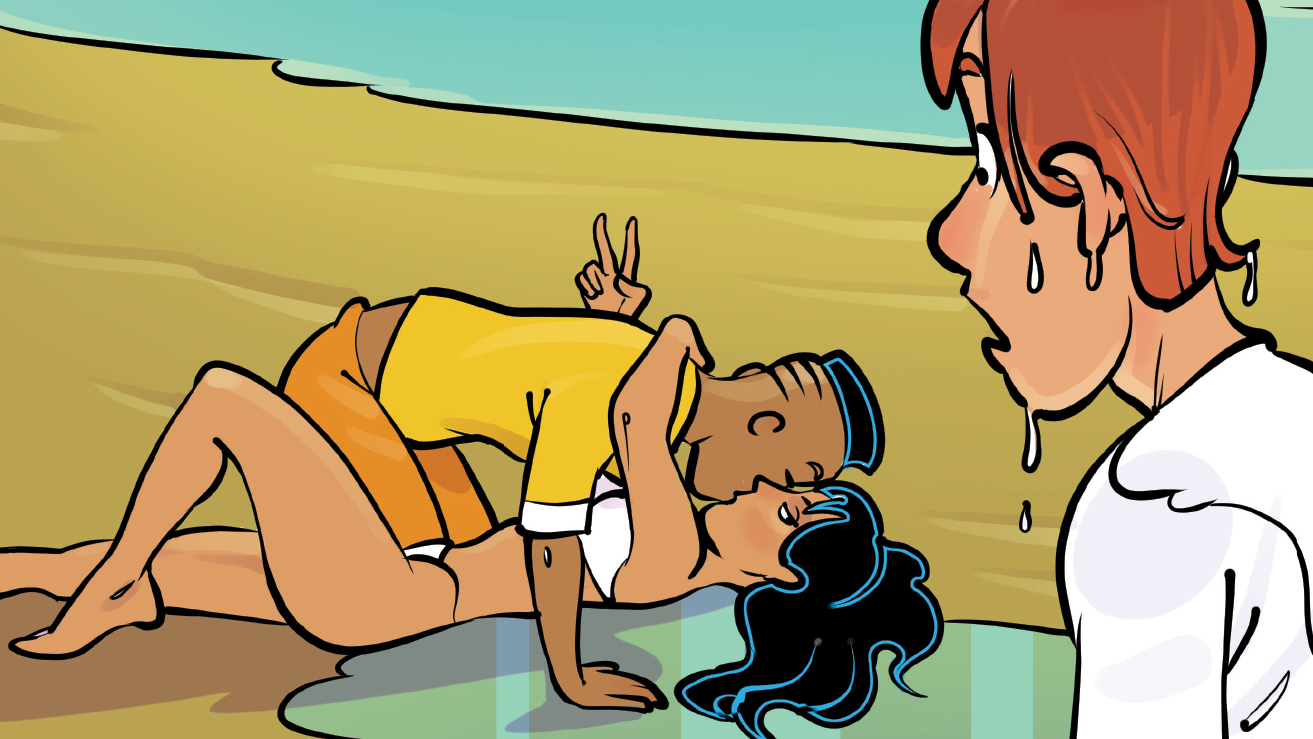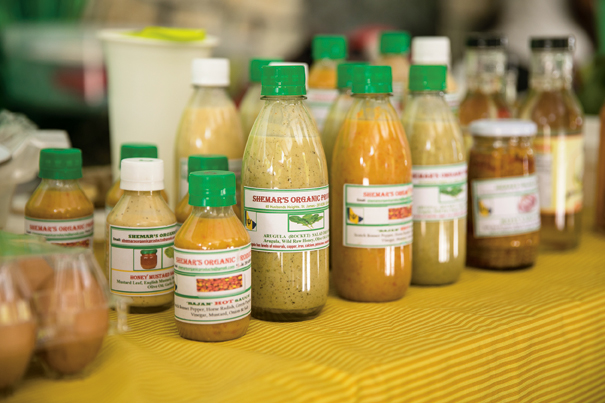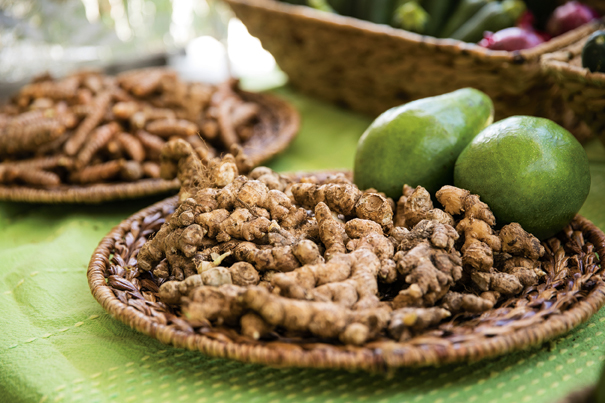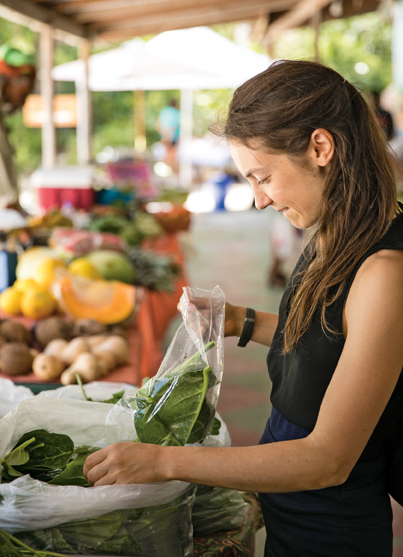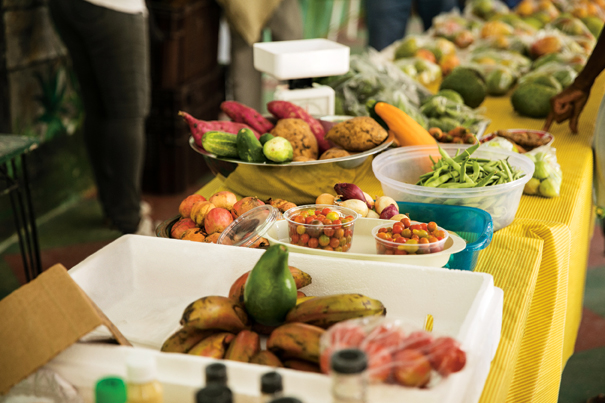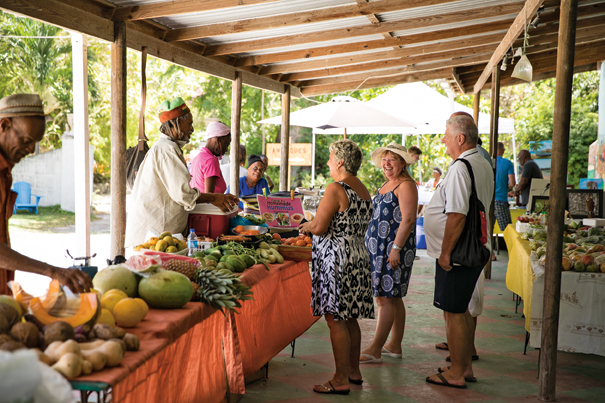Mangoes, Markets and Menus
“The imperial mango – that’s a serious mango!” says Roger (“Reggae”, like the music) of Bathsheba Blue Farm at the Holders Farmers’ Market, one Sunday morning. “It’s the Crocodile Dundee of all mangoes.”
— By Amie Watson
— Photography: Kenneth Theysen
He’s pointing to a green, beachball-sized fruit on display that can take up to a week to ripen in a brown bag on your counter, he says. Picked underripe, it’s delicious grated into salads, he adds. I believe him, mostly because he’s very tall, but also because he’s much smarter than me, as indicated by how his black and gray hair knows better than to resist the Barbados humidity (mine does not) and by how he charges me 10 BBD for a single Golden Lady melon.
Well, I believe him until he laughs – a hearty, full-bodied laugh that makes Coral Jordan, the lovely woman selling home-made hummus at the table next to him, roll her eyes.
Reggae continues, undeterred. Most people don’t know that multiple types of mangoes grow on Barbados, each with different flavours, colours and sizes. The small, green-yellow pawi mango is sweet-and-bitter and can be eaten right from the tree, he says.
“But what’s the best mango?” I ask. “The julie”, he says seriously, like the imperial mango, I imagine. “That’s the Rolls-Royce of all mangoes.” It’s sweet, without too many fibres that stick in your teeth as you gnaw the flesh from the pit – which you’ll do; knives are overrated with a mango that juicy.
Thanks to the collision of the Atlantic and Caribbean tectonic plates, which pushed fertile clay up and out of its ocean bed, Barbados is an island of abundance. In the rich soil of the island’s Scotland District, coconuts, mamey apples (which taste like apricots but crunch like apples) and guinep (which taste like lychee) abound, while bay leaves and broadleaf thyme perfume the air. The best part is that many fruits, vegetables, and wild herbs grow year-round, meaning there’s no off-season for a lot of local produce.
Yet it’s taken a while for chefs here to champion local farmers. As a small island with a large tourism industry, demand often outstrips supply. Local grouper, mahi-mahi and snapper have long been restaurant menu staples, but finally local sweet potatoes and squash are becoming more common accompaniments to tenderloins; pickled local radishes and breadfruit are pairing with sweet Caribbean shrimp and Bajan black belly lamb; and local garlic, ginger and lemongrass season Thai-inspired curry pastes (like in Chef Steven Belgrave’s recipe for Caribbean shrimp curry with coconut milk and green plantains).
Still, the best places to discover the local bounty are the farmers’ markets. Though Reggae didn’t remember me right away, I’d met him the previous morning at the Saturday morning Hastings Farmers’ Market when I’d bought that Golden Lady melon. But I’d been on North America time and the market had been on Barbados time, so only a few vendors had arrived by 8:30 a.m., a whole 30 minutes after the market’s official start.
Why arrive so early on a Saturday morning? Because I was coming from the Brighton Farmers’ Market, which for the past 18 years has run from 6 to 10 a.m. on Saturday mornings, and is known to disappoint visitors who arrive at 10:01 a.m. I was not about to miss the best papaya of my trip out of tardiness. (If you don’t think papaya tastes like anything, go to this market and buy a circular, softball-sized one with a few soft spots and a yellow-orange skin – that’s when it’s ripe. Slice it in half, scoop out the seeds and eat the juicy, sweet, slightly tangy flesh with a spoon, like a grapefruit half – but so much better.)
Speaking of breakfast, had I been craving egg, bacon and cheese pies, crêpes, Peruvian tamales, pink-frosted donuts, sweet coconut and cassava pone bread, home-made hot pepper sauces, or passion fruit pepper jelly (Natasha Davis of Nature’s Oils makes 10 sweet and spicy flavours of pepper jellies with exotic local fruit, from sour lime and ginger to golden apple), I could have had them at the Brighton Market.
But for locally made kombucha, head to the Sunday Holders Farmers’ Market, the only organic farmers' market on Barbados. A few stalls down from Reggae, Derick Went of Went Home sells lemongrass kombucha and dairy-free ginger kefir. His fruity, low- or no-caffeine, naturally sparkling teas are good for digesting last night’s cheesecake or a few too many rum punches, but are equally stellar when mixed with Mount Gay, Foursquare or St. Nicholas Abbey rums for a bubbly, low-sugar cocktail. It’s as though you’re sobering up while drinking.
Speaking of medicinal plants, Ras Moses forages for local noni leaf, gully root, saw palmetto, yellow sage, and cascara sagrada and uses them in his organic immunity, digestion and sleep tonics, which he also sells at the Holders Farmers’ Market. While I’ve yet to see an island foraging tour that brings you into the jungle, it might be for the best, since Barbados has a tendency to unleash torrential downpours. At those moments, you’ll be happy that you’re safely sequestered under the canopy at The Fish Pot, staring out at a floating dock in the peaceful water north of Speightstown while sipping a pungent rum punch dusted with freshly grated nutmeg (“1 of sour, 2 of sweet, 3 of strong, 4 of weak”, reads the sign at the restaurant’s entrance).
Or, in a deep nod to local, you’ll be tucked under the patio roof of Slow Food Barbados restaurant Cafe Luna, where much of Chef Mark de Gruchy’s menu is Barbados-grown, from the sweet potato in the gnocchi, to the tomatoes, cucumbers and sweet peppers in the salad, to the chicken in the Sauvignon Blanc demi-glace. If his organic farmers run out, there’s always the Cheapside Public Market in Bridgetown, where De Gruchy can buy eggplants, Scotch bonnet peppers, belly pumpkin and finger squash from local farmers.
Fortunately, the rain rarely lasts long. While the sky might spit a few more times, it inevitably decides, “No, I don’t think I’ll truly rain today” – a bit like trying on ties before a wedding, or pairs of shoes, and then deciding to go tie-less and barefoot, both sensible decisions when there’s sand and inevitable sunshine involved. And there always is – sand and sunshine – because it’s Barbados. It is paradise, after all.
Amie Watson
is a Montreal-based food and travel writer.
www.multiculturiosity.com
@MissWattson
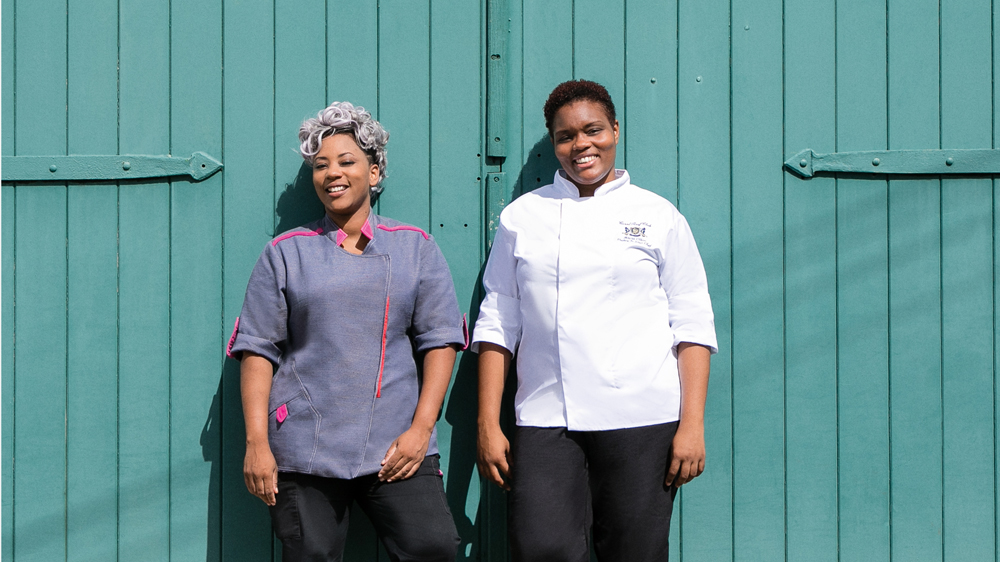
Crowning Achievements in the Kitchen
